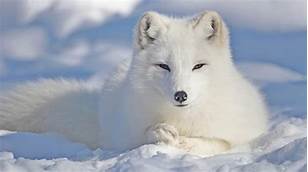Can Arctic Foxes Be Pets?
Arctic foxes are beautiful and fascinating creatures that have captured the imagination of many people. With their striking white fur and intelligent eyes, it's no wonder why some people might consider them as potential pets. However, before making a decision, it's crucial to understand the unique needs and challenges associated with keeping an arctic fox as a pet.

Temperament and Behavior
1. Wild Nature: Arctic foxes are wild animals and have an inherent desire to explore, roam, and hunt. They are not naturally domesticated like dogs or cats, which means they may exhibit unpredictable behaviors.
2. Socialization: Arctic foxes are social animals and need companionship. They can form strong bonds with their owners, but they require consistent and patient training to socialize them properly.
3. Activity Level: These foxes are highly active and require ample space to explore and exercise. Providing them with a large enclosure or allowing them to roam freely in a secure area is essential for their well-being.
Diet and Nutrition
1. Specialized Diet: Arctic foxes have unique dietary requirements and need a diet rich in meat, fish, and other animal-based proteins. A balanced diet is crucial for maintaining their health and preventing nutritional deficiencies.
2. Raw Food: These foxes thrive on raw meat and bones, which are crucial for their dental health and overall well-being. Feeding them raw food is recommended, but it's essential to ensure the meat is fresh and free from parasites or contamination.
Habitat and Enclosure
1. Spacious Enclosure: Arctic foxes require a large enclosure that allows them to move freely and engage in natural behaviors. The enclosure should include a den or sleeping area, a designated area for food and water, and plenty of space for exercise and exploration.
2. Cold Climate: These animals are adapted to cold climates and require temperatures below freezing for optimal health. Providing them with a temperature-controlled environment or access to an outdoor area with sufficient shade is essential.
3. Enrichment: To prevent boredom and stress, it's crucial to provide the fox with various enrichment activities, such as interactive toys, climbing structures, and hiding places. This will stimulate their natural instincts and keep them mentally engaged.
Health and Care
1. Veterinary Care: Arctic foxes require specialized veterinary care and should be taken to a veterinarian experienced in exotic animals for regular checkups and vaccinations.
2. Grooming: Regular grooming is essential to maintain their thick fur and prevent mats. Brushing their fur helps remove dirt and debris, promotes healthy skin, and strengthens the bond between the owner and the fox.
3. Exercise: These foxes have high energy levels and require daily exercise. Providing them with opportunities to run, play, and engage in physical activities is crucial for their physical and mental well-being.
Keeping an arctic fox as a pet is a complex and challenging endeavor that requires extensive knowledge, experience, and resources. These animals are not suitable for inexperienced pet owners and require specialized care and attention. Thoroughly researching and consulting with experts before making a decision is crucial to ensure the well-being of both the animal and the owner.
Declaration: All article resources on this website, unless otherwise specified or labeled, are collected from online resources. If the content on this website infringes on the legitimate rights and interests of the original author, you can contact this website to delete it.





